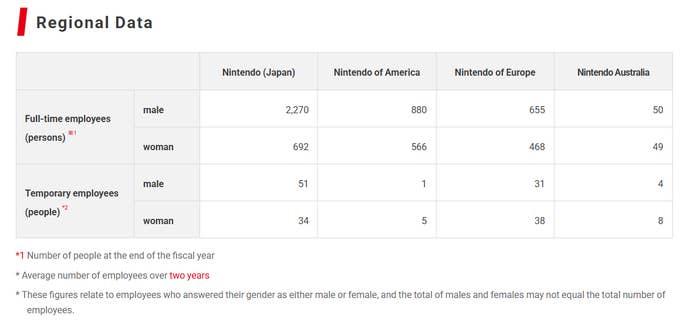Nintendo's recent reports indicate an increase in its workforce, along with a low employee turnover rate

Recently shared data about Nintendo's workforce indicates that employees have lengthy tenures with the company.
According to information highlighted by Go Nintendo and sourced from Nintendo's employee statistics, updated in June for the timeframe April 2024 to March 2025, employees at Nintendo Japan typically serve for 14.4 years on average.
Within Nintendo of America, this average employment duration stands at 10 years, with Nintendo of Europe higher at 11.1 years, and Nintendo Australia at 8.5 years. In general, men have a slightly longer tenure compared to women across these regions.
Japan's employee turnover rate is notably low at 1.9%, whereas the rate increases to 5.7% in America, 6% in Europe, and reaches 16.7% in Australia.
Globally, Nintendo employs 5,630 full-time staff, a modest figure considering the company's substantial earnings. For the fiscal year ending March 31, 2025, Nintendo reported a gross profit of $4.9 billion, which translates to $870,337 generated per employee.
In contrast, during the same period, Sony's Game & Network Services (G&NS) division consisted of 12,100 employees, a slight decrease from 12,700 the previous year. This division documented an operating income of $2.8 billion, equating to $231,404 per employee.

When reviewing Nintendo’s prior employee records for April 2023 to March 2024, there is a noted increase of 366 full-time staff within the past year, from 5,264 to 5,630.
Japan saw an increase of 148 employees, America 165, and Europe 56, whereas Australia experienced a minor reduction of three employees in their workforce.
The bulk of full-time employees are based in Japan, with 2,962 employees. America follows with 1,446 workers, Europe with 1,123, and Australia employing 99.
The gender composition varies significantly by location. In Japan, men make up 76.6% of the workforce, compared to 60.9% in America, and 58.3% in Europe. In Australia, the gender ratio is more balanced around 50/50.
For context, a 2022 study by UKIE reported that 67% of those working in the UK games industry identify as men, 30% as women, and 3% as non-binary or another gender.